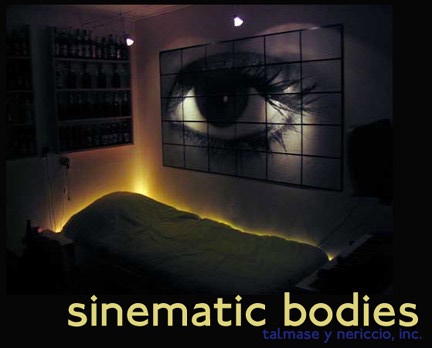 |
|||

1. Rebecca Tillett's work and career careen at a tangent to the issues raised by our Asylum Striptease, our Sinemadness. While not a student in our class, I have included this 23 year old photographer, designer, model in our ARTkive for reasons that should become obvious if you follow this hyperlinked text. Do beware, however--her site is R-rated and contains some representations that are bound to offend, or delight. If you follow the link and arrive at a page filled with html/xml coding, reload the page--there seems to be a glitch in the webmasters weave. 3. 4. 5. 6. 7. 8. -->back to the sinemadness mothership -->back to the sinemadness myspace incarnation. |
|||
| Courtesy of sinemadness citizen, Ashley
Hart!
"Hollywood Kids" Well they're sure keen on dancin'
Oh how the sun sets on my Boulevard
Oh how the sun sets on my Boulevard
Oh the death of a fast life.
Oh how the sun sets on my Boulevard
Oh how the sun sets on my Boulevard
So look closer, do you still think that,
|
|||
| FROM
AFTER OUR FEBRURARY 28, 2006 CLASS
...a sinematic movie if there ever was one--click the self-voyeur above; the LA TIMES story on Lehre, the filmmaker; the filmmaker's myspace site. |
|||
FROM
AFTER OUR FEBRURARY 28, 2006 CLASS

click the link above to refresh your memory of artists that west cites in the pages of DAY OF THE LOCUST
|
|||
FROM
OUR FEBRUARY 28, 2006 CLASS

21 AND OVER EXTRA-CREDIT--ATTEND THIS EVENT AND WRITE A REVIEW OF THE NIGHT! WEDNESDAY NIGHT!CLICK VISUAL UNDERGROUND LINK FOR INFO... |
|||
| FROM OUR JANUARY 19,
2006 CLASS
Jonathan Klassen's work is AMAZING--click the image to visit his mainpage; AN EYE FOR ANNAI is the first FILMS link on the top-left hand side of the page! |
|||
| Date:
Tue, 31 Jan 2006 15:19:30 -0800
To: memo@sdsu.edu From: memo@sdsu.edu Reply-To: memo@sdsu.edu Subject: e301 update! X-Junkmail-Whitelist: YES (by domain whitelist at razorgw2.sdsu.edu) hey there! hope you are enjoying the movie! for more info on its director tornatore, read the ebert gloss below; beware! it reveals parts of the movie however! for more info on freud (and Tornatore's movie is nothing if not a cinematic meditation on the premise of freud's theory--that all of our psychology is intoxicated with a childhood nostalgia that determines, in a way, our living now), go here: http://www-rohan.sdsu.edu/dept/english/301/freud.html for
info on UK study abroad in LONDON read this:
--History's
Dr. Andy Wiese
--the
main sdsu site for all thing summer in
--the
go-to academic superhero for a UK summer is
The
program is open to ALL majors.
LASTLY.... Go
ahead and start reading Walker Percy's MOVIEGOER for next week!!!!
cheers,
Bill
Nericcio
here's the EBERT ARTICLE.... This is a printer friendly version of an article from www.rogerebert.com Cinema
Paradiso
There is a village priest in "Cinema Paradiso" who is the local cinema's most faithful client. He turns up every week like clockwork, to censor the films. As the old projectionist shows the movies to his audience of one, the priest sits with his hand poised over a bell, the kind that altar boys use. At every sign of carnal excess - which to the priest means a kiss - the bell rings, the movie stops and the projectionist snips the offending footage out of the film. Up in the projection booth, tossed in a corner, the lifeless strips of celluloid pile up into an anthology of osculation, an anthology that no one will ever see, not in this village, anyway. Giuseppe Tornatore's "Cinema Paradiso," which is one of this year's Oscar nominees for best foreign language film, takes place in Sicily in the final years before television. It has two chief characters: old Alfredo (Philippe Noiret), who rules the projection booth, and young Salvatore (Salvatore Cascio), who makes the booth his home away from an indifferent home. As the patrons line up faithfully, night after night, for their diet of films without kisses, the boy watches in wonder as Alfredo wrestles with the balky machine that throws the dream-images on the screen. At first Alfredo tries to chase Salvatore away, but eventually he accepts his presence in the booth and thinks of him almost as his child. Salvatore certainly considers the old man his father, and (this is the whole point) the movies as his mother. I wonder if a theater has ever existed that showed such a variety of films as the Cinema Paradiso does in this movie. Tornatore tells us in an autobiographical note that the theater in his hometown, when he was growing up, showed everything from Kurosawa to the Hercules movies, and in "Cinema Paradiso" we catch glimpses of Charlie Chaplin, John Wayne and of course countless Hollywood melodramas in which men and women look smolderingly at one another, come closer, seem about to kiss, and then (with the jerk of a jump-cut) are standing apart, exchanging a look of deep significance. We become familiar with some of the regular customers at the theater. They are a noisy lot - rude critics, who shout suggestions at the screen and are scornful of heroes who do not take their advice. Romances are launched in the darkness of the theater, friendships are sealed, wine is drunk, cigarettes smoked, babies nursed, feet stomped, victories cheered, sissies whistled at, and god only knows how this crowd would react if they were ever permitted to see a kiss. The story is told as a flashback; it begins with a prominent film director (Jacques Perrin) learning in Rome that old Alfredo is dead and making a sentimental journey back to his hometown. Then we see the story of the director's childhood (portrayed by Cascio) and his teenage years, where he is played by Marco Leonardi. The earliest parts of the movie are the most magical. Then things grow predictable: There are not many rites of passage for an adolescent male that are not predictable and not many original ways to show the death of a movie theater, either. Tornatore's movie is a reminder of the scenes in Truffaut's "Day for Night," where the young boy steals a poster of "Citizen Kane." We understand that the power of the screen can compensate for a deprived life and that young Salvatore is not apprenticing himself to a projectionist, but to the movies. Once that idea has been established, the film begins to reach for its effects, and there is one scene in particular - a fire in the booth - that has the scent of desperation about it, as if Tornatore despaired of his real story and turned to melodrama. Yet anyone who loves movies is likely to love "Cinema Paradiso," and there is one scene where the projectionist finds that he can reflect the movie out of the window in his booth and out across the town square so that the images can float on a wall, there in the night above the heads of the people. I saw a similar thing happen one night in Venice in 1972 when they showed Chaplin's "City Lights" in the Piazza San Marco to more than 10,000 people, and it was then I realized the same thing this movie argues: Yes, it is tragic that the big screen has been replaced by the little one. But the real shame is that the big screens did not grow even bigger, grow so vast they were finally on the same scale as the movies they were reflecting. Cast & Credits Alfredo:
Philippe Noiret
Miramax Films Presents A Film Written And Directed By Giuseppe Tornatore, And Produced By Franco Cristaldi. Photographed By Blasco Giurato. Edited By Mario Mora. Music By Ennio Morricone. In Italian With English Subtitles. Running Time: 123 Minutes. No MPAA Classification. copyright 2005, rogerebert.com |
|||
 DISCLAIMER:
this GENERAL EDUCATION class will deal with ADULT issues and activities.
If you are squeamish about insanity, human sexuality, erotic taboos or
if graphic art, literature and film leave you weak, angry, disgusted etc.,
PLEASE drop this class BEFORE you get the urge to call on your parents
and clergy to remove me from my job! This is a university-level course
exploring usually hidden elements of the human psyche: you should EXPECT
to be disturbed and moved. Test your levels of tolerance! Does this
bother you? How about this?
Move forward with caution!!! DISCLAIMER:
this GENERAL EDUCATION class will deal with ADULT issues and activities.
If you are squeamish about insanity, human sexuality, erotic taboos or
if graphic art, literature and film leave you weak, angry, disgusted etc.,
PLEASE drop this class BEFORE you get the urge to call on your parents
and clergy to remove me from my job! This is a university-level course
exploring usually hidden elements of the human psyche: you should EXPECT
to be disturbed and moved. Test your levels of tolerance! Does this
bother you? How about this?
Move forward with caution!!! |
|||















